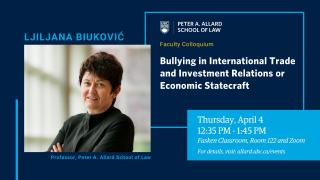Event Description
This presentation is based on research findings made in the first phase of the project funded by the Farris Research Fund and it focuses on the increasing application of economic coercion measures by politically and economically powerful states in the 21st century. Traditionally, the use of economic coercion has been considered as a form of economic statecraft. While international organizations at the multilateral and plurilateral levels have raised concerns about the destabilizing effects of economic coercion on the security and functioning of the international legal order and the multilateral trade system, they have provided no effective protection to states targeted by such measures. There are no international instruments of collective action against economic coercion and the existing international law remedies and countermeasures do not provide rapid relief to individual states against coercive trade and investment measures. This presentation analyzes legislative responses of the European Union and Canada to economic coercion and their actions before the World Trade Organization aimed at resisting coercive trade measures imposed by China on the EU and Canadian imports to China.
Speaker
- Allard School of Law
- General Public
- Research Talks

